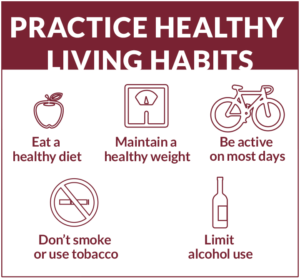

Best Health Practices
Practicing healthy habits is crucial for overall wellness and preventing ailments.
Here are some best health practices:
1. Regular Exercise:
Aim for at least 150 minutes of moderate aerobic activity or 75 minutes of vigorous activity per week, along with muscle-strengthening activities on two or more days per week.
2. Balanced Diet:
Consume a variety of fruits, vegetables, whole grains, lean proteins, and healthy fats. Limit consumption of processed foods, added sugars, and excessive sodium for optimal health.
3. Adequate Hydration:
Ensure to drink plenty of water all day long to maintain hydration levels.The recommended daily intake varies but is typically around 8 glasses (64 ounces) for adults.
4. Sufficient Sleep:
Aim for 7-9 hours of quality sleep per night. Establish a regular sleep schedule and develop a calming bedtime routine to enhance sleep quality.
5. Regular Health Screenings:
Schedule regular check-ups with your healthcare provider for screenings and preventive care, such as blood pressure, cholesterol, and cancer screenings.
6. Stress Management:
Practice stress-reducing techniques such as deep breathing, meditation, yoga, or spending time in nature to promote mental well-being.
7. Maintain a Healthy Weight:
Strive for a body weight within a healthy range for your height and build. Such practices mitigate the risk of various chronic ailments.
8. Limit Alcohol and Avoid Smoking:
Drink alcohol in moderation, if at all, and avoid smoking and exposure to secondhand smoke
9. Personal Hygiene:
Practice good hygiene habits such as regular handwashing, dental care, and skincare to prevent the spread of illness and maintain overall health.
10. Social Connections:
Cultivate strong social connections with friends, family, and community members. Social support can significantly enhance both mental and physical well-being.
11. Sun Protection:
Protect your skin from the sun’s harmful UV rays by wearing sunscreen, protective clothing, and seeking shade when outdoors.
12. Continual Learning and Mental Stimulation:
Engage in lifelong learning, hobbies, and activities that challenge your mind and promote cognitive function.
These practices contribute to physical fitness, mental health, disease prevention, and longevity. Embracing best health practices fosters a healthier lifestyle, reduces the risk of chronic diseases, enhances quality of life, and promotes productivity and happiness.
Remember that everyone’s health needs are unique, so it’s essential to personalize these practices to suit your individual circumstances.
FAQ’s on Best Health Practices:
1. How can good health practices be helpful in preventing communicable diseases explain?
Ans: Good health practices play a vital role in preventing communicable diseases by reducing the risk of exposure to pathogens and strengthening the body’s immune system.
Regular handwashing with soap and water helps eliminate germs, while practicing good respiratory hygiene, such as covering coughs and sneezes, prevents the spread of respiratory infections like colds and flu.
Maintaining a healthy lifestyle through balanced nutrition, regular exercise, and adequate sleep boosts immune function, making individuals more resilient to infections.
Additionally, following vaccination schedules protects against specific communicable diseases by providing immunity.
Overall, adhering to good health practices creates a barrier against communicable diseases and promotes overall well-being.
2. What is best practice health and social care?
Ans: Best practice in health and social care refers to the most effective and efficient approaches to delivering services that promote the well-being of individuals and communities. It involves evidence-based strategies, professional standards, and ethical considerations to ensure the highest quality of care.
This includes personalized treatment plans, holistic approaches, patient-centered care, effective communication, continuous learning, and collaboration among healthcare providers and social workers.
Best practice in health and social care aims to improve outcomes, enhance safety, respect individual dignity, and promote autonomy and empowerment for those receiving care.
3. Best health care tips?
Ans: Here are some best healthcare tips:
- Stay active: Engage in regular exercise or physical activity.
Eat a balanced diet: Include fruits, veggies, lean proteins, and whole grains for a balanced diet.
- Keep hydrated: Ensure to drink enough water to keep yourself hydrated throughout the day.
- Prioritize enough sleep: Target 7-9 hours of uninterrupted, rejuvenating sleep each night.
- Practice good hygiene: Wash hands frequently, cover coughs and sneezes, and maintain cleanliness.
- Manage stress: Find healthy ways to cope with stress, such as meditation or hobbies.
- Stay updated on vaccinations: Follow the prescribed vaccination schedules..
- Attend regular check-ups: Visit healthcare professionals for preventive screenings and exams.
- Limit alcohol and avoid smoking: Keep alcohol intake moderate and abstain from tobacco products.
- Practice safe behaviors: Use protection during sexual activity and practice safe driving habits.
4. Examples of good health practices?
Ans: Examples of good health practices include Regular exercise, Balanced diet, Hydration, Adequate sleep of 7-9 hours of quality sleep each night, Handwashing, Stress management, Regular check-ups, Vaccinations, Sun protection, Avoid harmful substances.
For further details access our website: https://vibrantfinserv.com
